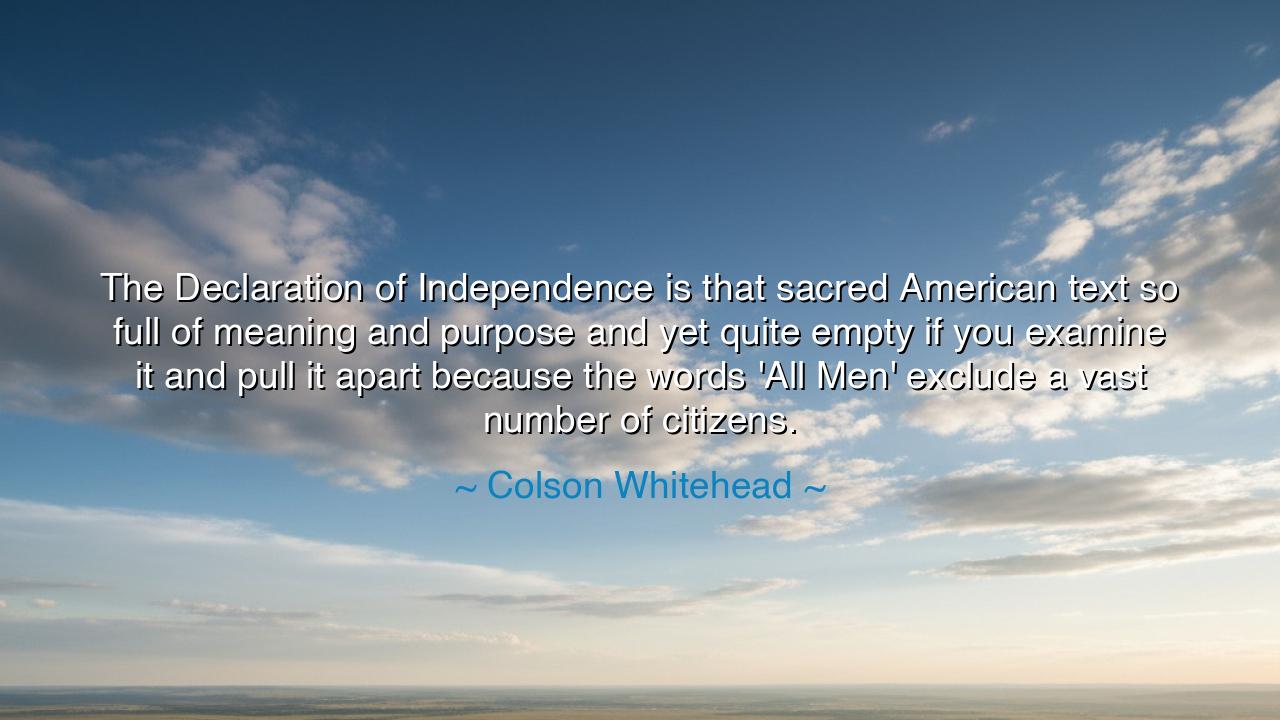
The Declaration of Independence is that sacred American text so
The Declaration of Independence is that sacred American text so full of meaning and purpose and yet quite empty if you examine it and pull it apart because the words 'All Men' exclude a vast number of citizens.






The words of Colson Whitehead pierce the veil of reverence that often surrounds history, revealing both the glory and the wound at its core. “The Declaration of Independence is that sacred American text so full of meaning and purpose and yet quite empty if you examine it and pull it apart because the words ‘All Men’ exclude a vast number of citizens.” In this statement lies a truth both uncomfortable and necessary: that even the noblest of documents can carry within them the contradictions of their age. Freedom, though proclaimed, was never fully given; equality, though declared, was never fully lived. Whitehead’s insight is not a dismissal of the Declaration — it is a call to complete it.
The Declaration of Independence, penned in 1776, was meant to be a trumpet of liberation — a defiance against tyranny, a birth cry of a nation. Its words have rung through centuries: “We hold these truths to be self-evident, that all men are created equal.” Yet, as Whitehead reminds us, those words were penned in a world where women had no vote, enslaved Africans were counted as property, and Indigenous peoples were written out of the human story altogether. The parchment proclaimed equality, but the soil upon which it was signed was still stained with inequality. Thus the Declaration became both holy and hollow, sacred in vision yet scarred in execution.
The ancients taught that truth is born not in perfection, but in paradox. The Founding Fathers, in seeking to free themselves from a king, left unfreed the countless others within their midst. The power of Whitehead’s words lies in this recognition — that America’s promise has always been a work unfinished. The phrase “All Men” was never only a statement of who was included, but an indictment of who was not. To “pull it apart,” as he says, is not to desecrate the document, but to reveal its incompleteness — and in doing so, to demand that it be made whole.
History gives us many who dared to expand the circle of freedom first drawn too small. Consider Frederick Douglass, who in his fiery 1852 speech, “What to the Slave Is the Fourth of July?”, exposed the hypocrisy of celebrating liberty in a land still chained by slavery. Yet he did not reject the ideals of the Declaration — he challenged America to live up to them. So too did Susan B. Anthony and Elizabeth Cady Stanton, who read those same sacred words and declared that “All Men” must include women, or the Declaration was a lie. And in the twentieth century, Dr. Martin Luther King Jr. stood at the Lincoln Memorial and called the Declaration a “promissory note,” one that had been returned with insufficient funds to the descendants of those left out. These were not destroyers of the dream — they were its true inheritors.
Whitehead’s reflection carries the weight of all those who came after, all who saw in the founding words not completion, but invitation. The Declaration of Independence is, in truth, not a finished scripture but a living covenant — a challenge to each generation to give flesh to its spirit. Its emptiness, as Whitehead observes, is not the void of failure but the space waiting to be filled by justice. Every act of reform, every voice that rises for the excluded, is another line written upon that parchment, another breath of life into its once-limited vision.
But there is also humility in this truth. To revere a nation’s founding ideals without questioning them is to worship stone idols rather than living principles. The ancients would have called this idolatry — to confuse the words of men with the perfection of truth. True patriotism is not blind loyalty to history, but devotion to the progress of the human spirit. A nation that loves itself honestly must be willing to confront its reflection, to see both its beauty and its blemish. For only in honest reckoning can a people be made whole.
Let this be the lesson: that every age must reread its founding words and ask, “Who still stands outside their promise?” The measure of a civilization is not how proudly it recites its declarations, but how faithfully it fulfills them. Let citizens, teachers, and leaders alike remember that freedom once denied must be freedom restored; that equality once withheld must be equality extended. For when “All Men” truly means all humanity, the Declaration will cease to be empty — and will at last become what it was meant to be: not merely a document of independence, but a living testament to interdependence and universal dignity.
And so, as Whitehead’s wisdom reminds us, we must not shrink from examining the sacred — for through examination, we redeem it. The Declaration of Independence, born in contradiction, becomes pure only through courage: the courage to admit, to amend, to aspire. Let us then not worship the past, but perfect it — so that future generations, when they speak of freedom, may find in those words no exclusion, no emptiness, but the full and radiant light of justice fulfilled.






AAdministratorAdministrator
Welcome, honored guests. Please leave a comment, we will respond soon